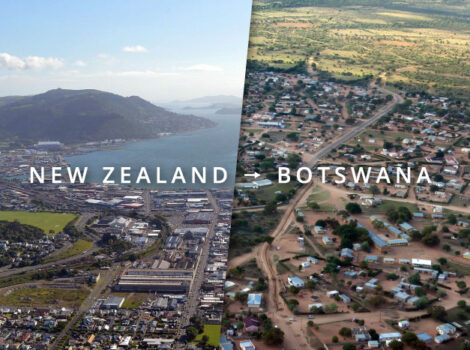
The Assistant Minister of Investment, Trade and Industry, Molebatsi Molebatsi says the government through the Ministry of Mineral Resources, Green Technology and Energy Security should expedite the resolution of electricity issues at production areas.
Speaking during a tour of Kwenantle Farmers at Talana Farms, Assistant Minister Molebatsi said the electricity issues that haunt Botswana are cited among the factors that hinder doing business in Botswana as per the World Bank report of 2020. According to Molebatsi, the report ranked Botswana 96th out of the 190 countries assessed.
Molebatsi was responding to a comment from Kwenantle Farmers shareholder, Lembie Mmereki, who cited Botswana’s exorbitant electricity charges as one of the challenges they face. The Botswana Power Corporation this year hiked rates by a whopping 22% and plans further annual increments over the next few years.
“With the current rates, we believe it is very unsustainable for us as a business,” said Mmereki.
Mmereki felt the eye-popping electricity tariffs may ultimately put many Batswana farmers off farming. Molebatsi conceded electricity rates are especially high for production areas and suggested that they consider tapping into solar energy to ameliorate the situation. The Assistant Minister said his tour of production areas was necessitated by the challenge facing his Ministry to facilitate businesses that could ensure food security and create employment of Batswana, among other things.
“Why should we be net importers of food?” Molebatsi asked rhetorically, adding, “It should not happen.”
Molebatsi urged Batswana farmers to produce enough food to feed the nation and export to other countries in case of a surplus. He noted exporting would be necessitated by various instruments such as free trade agreements and the SADC industrialisation policy inter alia.
“We’re committed to supporting sustainable businesses,” said Molebatsi.
YourBotswana view…
Hearing that Botswana’s longstanding power issues are impacting on doing business in the country comes as no surprise. It also beggars the question, what’s stopping the government putting an end to these issues once and for all? According to opml.co.uk, blackouts during the last ten years in Europe and Northern America have demonstrated an increasing likelihood of supra-regional blackouts with accompanying large economic losses.
As the site states, electricity is the backbone of each industrialised society and economy. The increased dependency on continuous power supply related to electronics, industrial production and daily life makes today’s society much more vulnerable concerning power supply interruptions. Emergency services like fire, police or ambulance could not be called due to the breakdown of the telecommunication systems. Hospitals would only be able to work as long as the emergency power supply is supplied with fuel. Financial trading, cash machines and supermarkets would in turn have to close down, which would ultimately cause a catastrophic scenario.
The Assistant Minister urges the farmers to lean more on solar energy when the government itself seemingly continues to drag its feet on the solar issue when it could lead by example. There’s no consideration here that if the government considers the solar option too costly, the same almost certainly applies to individuals and businesses. He encourages them to produce more, they tell him the power supply issue and the exorbitant tariffs are a huge challenge. He agrees the power rates are too high and that the Ministry of Mineral Resources, Green Technology and Energy Security should expedite the resolution of electricity issues at production areas. BUT all his words count for nothing unless he puts his money where his mouth is. It’s all fair and well to agree, but besides encouraging the farmers to look towards solar to address their power issues, where are the Assistant Minister’s assurances about what his Ministry plans to do? The Ministry of Mineral Resources, Green Technology and Energy Security could do well to take a good look at how Botswana’s power issues are impacting on people’s lives, businesses and the economy to wake up to just how grave the situation is.
Implications of a power supply in tatters on the economy
For businesses, unreliable electricity results in increased running costs and reduced productivity and profitability.
Large companies cannot function long without the use of items such as computers, manufacturing equipment, and lights. Companies that rely on networks and web-based technologies may experience setbacks in the event of an outage. Power outages can affect your business in a variety of ways. Each way can have an impact on the bottom line of your business and your productivity:
Lost Customers and Revenue: When power outages occur, sites may go down and result in lost customers and lost revenue. When customers can’t access your website, they may have no way to purchase products. This one-time power outage could impact how they perceive your company. A damaged reputation can have long-term effects on your revenue. Gaining these customers back might require significant marketing efforts, which can be costly.
The relentless power outages and/or load shedding in Botswana lead to many businesses across all sectors – from retail and service to manufacturing and industry – losing sales.
According to opml.co.uk, it’s estimated that the loss to South Africa’s businesses and industries that battle with scheduled power cuts is about R1 billion per stage, per day.
Unturned Inventory: Inventory turnover refers to the number of times a company’s inventory is sold or replaced during a specific period of time. If you experience downtime due to an outage, the speed at which you sell your inventory will decrease. If customers aren’t able to make purchases, your unturned inventory will increase.
Decreased Employee Productivity: Downtime as a result of power outages has an impact on employee productivity. Employees may not be able to complete their tasks when key equipment is down. Also, IT employees may need to work overtime to resolve problems or professionals may need to be hired to help recover lost data and get systems running again. Depending on the duration of the power outage, lower employee productivity can have a huge effect on your businesses bottom line.
Costly backup systems- For some firms, spending money on backup generators (an expensive alternative to grid electricity) becomes a necessity, reducing the amount they can spend on more profitable investments. In terms of macroeconomics, the costs may be significant.
Overall economic losses due to power interruptions are estimated to cost between one and five% of the GDP of countries across Sub-Saharan Africa. South Africa’s GDP was forecast to grow less than one per cent last year, with the problems at Eskom being one of the main contributing factors. According to new research from CSIR, the total economic impact of load shedding in South Africa over the past 10 years could be as high as R338 billion. In 2019 alone, there were significant impacts on the economy – the estimated cost being between R60 billion and R120 billion.
To make matters worse, South Africa’s economy is already fragile; it’s experiencing high and rising debt, low growth, record-high unemployment and diminished investor confidence. If these findings are to be believed, then surely, Botswana is in the same boat or not too far behind?
Stored Computer Data Lost: Power outages are one of the top reasons data loss occurs. Because computers and operating systems are complex, they need to shut down properly. An outage causes computers to shut down unexpectedly. Any files you were working on could be lost or become corrupted. If power outages occur frequently, they can damage your hard drive and reduce its lifespan.
Damaged Equipment: Power outages can cause long-term damage to your equipment. The greatest cause of equipment damage from power outages is the electrical surges that occur when the power is restored. Not having a proper backup power supply or not implementing protection from surges can cause your equipment to become damaged when the power comes back online. Also, the cost to repair equipment is an unanticipated expense that could set you back.
In today’s world, even a short-term loss of power can lead to significant loss in a variety of industries.
Power outages can occur at any time, and if businesses in the following industries are not prepared, they may experience significant downtime and loss of revenue:
Data Centers: Data centres are facilities that contain organisations’ IT operations and equipment. These centres store, organise, manage and process a company’s data. When a data centre goes down due to a power outage, the loss of mission-critical data can occur. Since companies rely heavily on data stored in their data centres, losing this crucial information could affect everyday operations long-term.
Medical Facilities: Patients’ lives depend on crucial medical equipment operating properly even after a power outage occurs. Typically, hospitals have backup generators to make sure everything continues to run. These generators require continuous maintenance and testing to ensure they will work in the event of a power outage. Patient data and lives are all on the line when the power goes out. And without working telephone lines, people will not be able to call emergency services for help.
Financial Corporations: Companies involved in the stock market can lose out on millions of dollars in a fraction of a second if a power outage occurs. Because transactions happen every second, even a short-term outage can have a drastic impact on businesses.
Retail and Wholesale: Companies in the retail industry suffer lost sales revenue with unplanned outages. For larger retail companies, a few minutes of downtime can lead to tens of thousands of dollars in lost revenue. To understand the possible impact, we can look at Amazon. In 2016, Amazon’s website was unavailable for 13 to 15 minutes. They estimated that this short lapse lost the retailer $2,646,501 in revenue. Although Amazon’s site did not go down due to a power outage, they serve as a perfect example of how downtime can affect a business.
Reference: BOPA, http://www.opml.co.uk/blog/south-africa-s-crippling-electricity-problem / http://fosterfuelsmissioncritical.com/power-outage-effects-businesses/#monetary-loss-power-outage




True that. Power curs is a somber issue in our country but I have a solution to that. Call me on 74417178 or 71232429 for more information or talk to me on facebook . My fb name is Kemmonye Keipiditse.